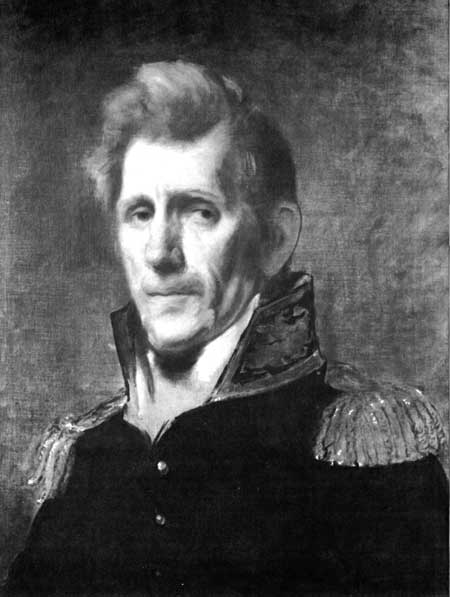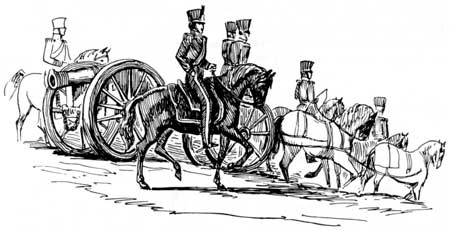|
CHALMETTE National Historical Park |
 |

Gen. Andrew Jackson, painted from life in 1817 by Samuel Lovett
Waldo.
Courtesy, The Metropolitan Museum of Art, New York.
THE LAST WAR between the United States and Great Britain was fought from 1812 to 1815. It ended in a draw, neither side gaining its objective. Yet the Battle of New Orleans, the last big battle and greatest American land victory of that war, had important results in American history.
This is true even though it was fought on January 8, 1815, after the peace treaty between the two nations had been signed at Ghent, Belgium, on December 24, 1814. Even if news of the signing had reached them, the British might have attacked New Orleans. They had orders to fight until the treaty was ratified, which was not done until February 1815. After Gen. Andrew Jackson's victory at New Orleans, the British could only withdraw. The Lower Mississippi Valley was saved for the United States.
Coming at the end of an unsatisfactory war, victory restored the confidence of Americans in their ability to win battles. It particularly gave the "Westerners" of that day—the people of the Ohio and Mississippi Valleys—a chance to assert themselves in national affairs. Their leader, Andrew Jackson, the conqueror of British and Indians became President.
The news of this victory helped to break up a movement for disunion in 1815. Without the national pride stemming from the Battle of New Orleans, the Union might not have survived the Civil War 50 years later.
The New Orleans Campaign of 1814—15 was a spectacular clash between picturesque fighters from many parts of the globe. The anniversary of the crowning victory on January 8, 1815, is still celebrated in New Orleans. On that day, a motley group of frontiersmen, regulars, Creoles, sailors, pirates, Indians, and Free Men of Color was pitted against the flower of the British Army. A group of mainly irregular troops, inferior in numbers, overwhelmingly defeated a force of recognized valor and proven ability.

The War of 1812
France and Great Britain were at war most of the time from 1793 to 1815. During this conflict, the two nations often violated American neutrality. The French seized American ships and goods; but the British did worse—they stopped American ships at sea and removed American sailors. President Thomas Jefferson tried by economic means to force other nations to respect neutral rights. He persuaded Congress to pass an embargo on American export trade with foreign nations. This action aroused so much opposition in this country that Jefferson at length yielded. Shortly before leaving office in 1809, he signed a bill which prohibited trade only with France and Great Britain until these nations changed their practices. These restrictions failed to protect American commerce.
In his tangled relations with the French and British, James Madison, the next President, was no more successful in settling American maritime grievances.
Despite maritime insults, the demand for war did not come primarily from the shipowners. It came from the men of the "West" of that day—the men living on the frontier curving from Vermont around through western New York, Ohio, Kentucky, and Tennessee to Georgia. Shipowners made profits in spite of seizures, and conservative Easterners felt England to be the preserver of order. By contrast, hostility toward the former mother country persisted among the "Westerners" who believed that British intrigue was behind their Indian and frontier land troubles. These frontier grievances led to demands for territory in both Canada and Florida. The "Western" attitude was intensified by economic hard times on the frontier from 1807 until war broke out. The frontiersmen believed that these conditions were caused by British restrictions on American shipping. The West furnished most of the troops for the defense of New Orleans.
In spite of the prowar sentiments of the frontier, the war might not have started had there been faster ways of communication. On June 16, 1812, the British Orders in Council were suspended in belated reaction to Jefferson's embargo. These orders barred American ships from continental European ports and were to be given as one of the major reasons for declaring war. On June 18, 1812, before the news could cross the ocean, Congress declared war against Great Britain.
The war that followed was fought rather half-heartedly. Trading between enemies continued. Peace negotiations began shortly after hostilities broke out and continued intermittently throughout the struggle. Great Britain, still fighting Emperor Napoleon of France did little more in the first 2 years than help defend Canada. The unprepared United States tried to invade Canada, but was repelled and attacked on its own soil. Detroit and Fort Dearborn (on the site of Chicago) were soon lost, and the Americans were repulsed at Niagara. On the ocean, Americans usually won in duels between ships, but their navy was outnumbered. The British remained masters of the seas and could land troops where they chose.
The situation in the spring of 1814 was ominous for the Americans. The defeat of Napoleon released British troops, who soon took the offensive. Their government planned a triple thrust in the United States by way of Lake Champlain, the Chesapeake Bay, and, later, the Gulf Coast. In September 1814, the Battle of Plattsburg, N. Y., ended the first invasion when Commodore Thomas MacDonough defeated the British fleet on Lake Champlain, forcing the British Army to retreat. After burning the White House and the Capitol, the second expedition withdrew when it failed to pass Fort McHenry, the main defense of Baltimore. The third invasion was met by Andrew Jackson at New Orleans.

|

| History | Links to the Past | National Park Service | Search | Contact |
|
Last Modified: Mon, Dec 2 2002 10:00:00 am PDT |

